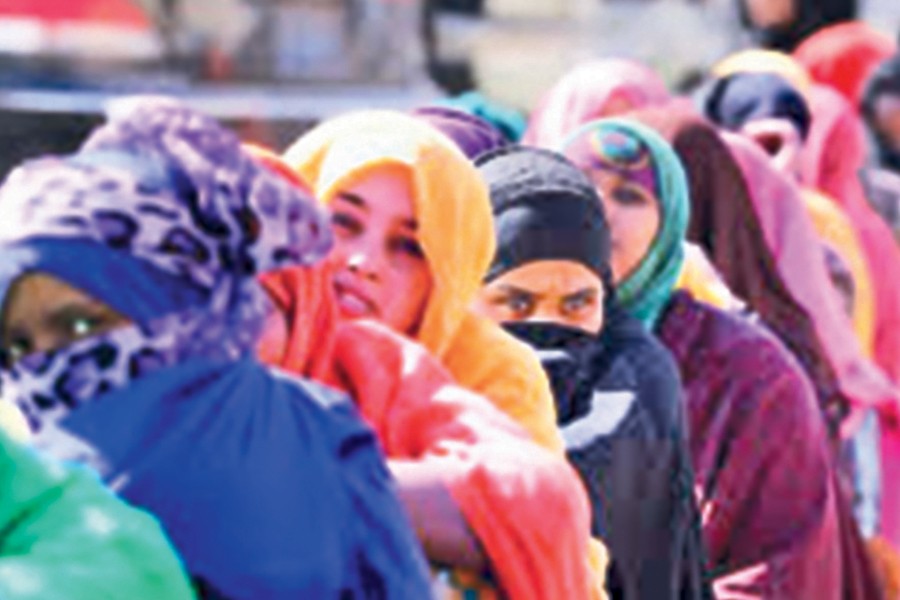Under-aged and overaged Bangladeshi women are being sent abroad for doing domestic jobs, risking their safety, sanctity and lives, according to complaints lodged by victims.
Investigations have found that a section of manpower recruiters has been engaged in doctoring certificates, confirming the age of aspiring female migrants to meet the requirements of age limit, between 25 years and 40 years, as fixed by the government.
The women aged below 25, particularly teenage girls, face immense sufferings at their workplaces as they cannot cope with the workload and are subjected to physical and sexual abuse, say sector insiders.
Mina (pseudonym) is such a girl, 13, who had fallen prey to the trap of an 'easy job' in Jordan. Struggling for want of money and offered a monthly pay of Tk 20,000 (US$240), her family agreed to send her abroad, they admitted.
A local dalal (middleman) made her a passport and admitted her to a pre-departure training centre where she was advised to wear a burka (veil).
The teenager said she was not aware of minimum legal age for domestic migrant workers and when the supervisor of the centre found out her actual age, she was sent home.
The middleman then managed to secure a 30-day training certificate and emigration clearance card. On arrival in Jordan, Mina found that she would have to serve a family of 16 alone.
She was beaten by her first two employers and she had to starve often, she recalled. Her third employer accused her of stealing and she had to spend six months in jail before her flight home, she said.
"I'm back home with no pay, only bitter memories of torture, false accusation, and spending months in jail," Mina said.
About 11 per cent of the Bangladeshi women migrants were under 25 years old and the girls below 18 years of age comprise 4.0 percentage points, according to a study on 'Access to Justice for Bangladeshi Migrant Workers: Opportunities and Challenges', conducted by Ovibashi Karmi Unnayan Program (OKUP) in 2019.
The Bureau of Manpower Employment and Training (BMET) data show that on average 100,000 women go abroad with jobs every year.
Such a hiring process exposes the Bangladeshi women to torture and traumatic experience, rights activists say.
"It's alarming and violation of international labour laws," OKUP chairman Shakirul Islam told the FE.
Young women are often treated as sex slaves as a section of employers demands young girls, he said, adding that some dishonest recruiters send them abroad illegally.
Overaged women reportedly face different kinds of maltreatment.
A recruiting agency, MH Trade International, sent a 14-year-old girl to Saudi Arabia showing her as a 25-year-old woman. The death of the girl named Umme Kulsum created hue and cry in recent times.
Her father complained to the BMET that his daughter was tortured physically, mentally and sexually at her employer's house that led to her death.
Head of BRAC's migration programme Shariful Islam Hasan mentioned that Kulsum was sent to Saudi Arabia through official channel.
"So, both employers and recruiters are involved in such heinous crimes. It's they who have to be brought to justice," he suggested.
At least 294 Bangladeshi women migrants died at workplaces in Saudi Arabia, the United Arab Emirates, Oman, Lebanon and Jordan between 2016 and 2019, according to the Brac data.
Stroke, heart attack, accident, suicide and natural death were cited as reasons for the deaths.
Stressing on the right selection of women workers, Dr Sakawat Ali, director (training operation) at the BMET, said if workers or recruiters manipulate birth dates, they have "nothing to do".
Passport and national identity cards are processed by other departments.
"Still, we disallow candidates when we see that they may have hidden their age in passports," he added.
When contacted, Benjir Ahmed, president of Bangladesh Association of International Recruiting Agencies (BAIRA), said recruiting agencies have no dealings with the process of passports and other documents.
Recruiters provide visa-related services to workers, he pointed out.
On allegations of malpractice, Mr Ahmed said he has no idea, if any recruiter is involved in such acts.


